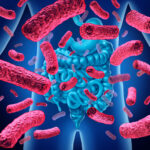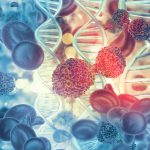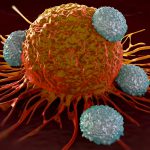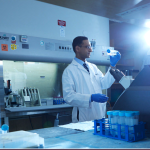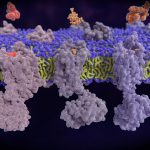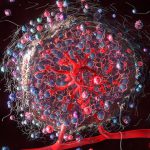A new study found that melanoma patients’ gut bacterial communities, which differ depending on a patient’s geographical region, are associated with favorable or unfavorable responses to cancer immunotherapy.

Dr. Hassane Zarour
In the study, published recently in Nature Medicine, University of Pittsburgh and UPMC researchers identified groups of gut bacteria associated with favorable and unfavorable response to a type of immunotherapy called immune checkpoint blockade. They also found that microbes exert the most influence on melanoma patient outcomes about one year after starting treatment. By providing insights into how and when bacteria influence immune responses, the findings could aid development of microbiome-based cancer therapies.
“Immunotherapies are one of the most effective treatments for advanced solid tumors, including melanoma, but many patients do not respond to this type of treatment,” said study coauthor Dr. Hassane Zarour, professor of medicine at Pitt and cancer immunologist at UPMC Hillman Cancer Center. “In this study, we delve deeper into the mechanisms behind response versus non-response. Our findings are important because they shed new light on the complex interaction between the gut microbiome and response to cancer immunotherapy, providing a roadmap for future studies.”
Immune checkpoint blockade uses inhibitor drugs that block a pathway protecting tumor cells from the immune system. Research shows that the gut microbiome plays an essential role in melanoma patients’ response to this immunotherapy. In a previous study, Zarour and Dr. Diwakar Davar, a medical oncologist at Hillman and assistant professor of medicine at Pitt, found that transplanting fecal microbes from responders to non-responders can enhance success of immune checkpoint blockade. However, across other studies, researchers have linked different bacteria with favorable and unfavorable immunotherapy responses, which has hindered development of microbiome-based cancer therapies.

Dr. Diwakar Davar
To address this gap, Zarour and Davar’s team collected stool samples from 94 melanoma patients living in Pittsburgh who received immune checkpoint therapy. They analyzed bacterial composition in these samples and compared the results to four previously published datasets from patients treated in Houston, New York, Dallas and Chicago.
The researchers identified distinct communities of gut bacteria, or enterotypes, in patient samples. Two enterotypes were associated with responders, and two were linked with non-responders. They also found that enterotype distribution differed according to geographical location, which could be due to differences in dietary habits, lifestyle, environment and climate.
“A trail of different publications identified different bacterial signatures associated with immunotherapy response, which fueled skepticism among researchers and clinicians that the microbiome could influence immune response,” said Zarour. “Our analysis explains these discrepancies by showing that past studies report at least one of two enterotypes.”
Another finding was that the composition of gut bacteria was most important for immunotherapy response at about one year after initiation of treatment, while factors associated with the tumor played a bigger role at the start of treatment. According to the researchers, this suggests that favorable microbes may need to be maintained throughout therapy to prevent disease progression.
The researchers also examined gene expression in patient intestinal cells, which are shed in stool. Non-responder patients had high levels of a biomarker for inflammation induced by lipopolysaccharide, a bacterial compound produced by unfavorable bacteria. The findings suggest that the mechanism by which unfavorable bacteria promote immunotherapy resistance and adverse side effects is via lipopolysaccharide-induced inflammation.
“By improving our understanding of bacterial enterotypes, we aim to improve therapeutic interventions for cancer patients through manipulation of the gut microbiome,” said Davar. “This could not only improve outcomes of patients treated with immunotherapy but also reduce side effects associated with these treatments.”
The authors said that additional research in patients from across the globe and in various cancers is needed to further define bacteria that influence immunotherapy responses.
Anu Balogun is a Ph.D. candidate in the University of Pittsburgh School of Medicine’s Department of Pathology. She is participating in the UPMC Science Writing Mentorship Program.




